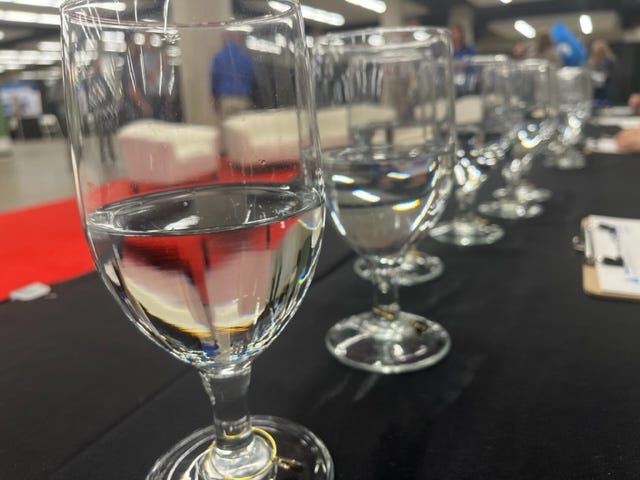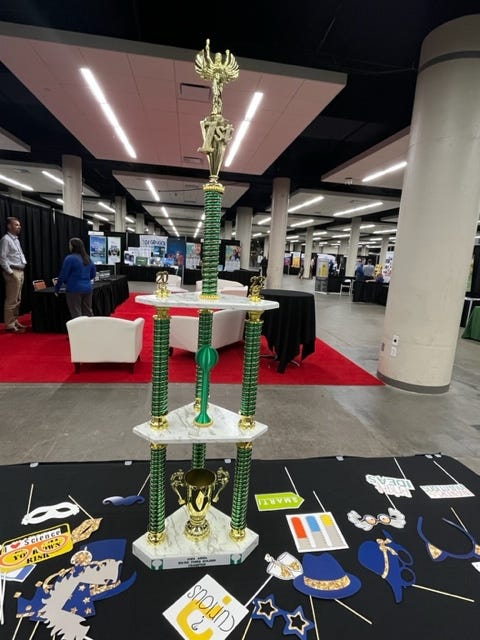Working in a visual medium, television journalism, for 22 years in Iowa means that I have the privilege to experience unique things and meet fascinating people. This month, that meant another first: I got to serve as a tap water taster. It wasn’t just a fun day; it was also an important reminder.
I’ve been drinking water for nearly my entire life. We don’t drink water as infants, right? But I admit that I was a bit intimidated to join a judges’ panel to choose which Iowa municipality had the best water.
Christina Murphy, the general manager of West Des Moines Water Works (and fellow Mizzou alum!), assured me that I was sufficiently qualified to judge the Iowa Section of the American Water Works Association 2023 Tap Water Taste Test in downtown Des Moines. (That’s a mouthful, huh? Glad I didn’t have to say the full name on television.)
(Thought bubble: How do you prepare for an event like this? Drink as much water as possible to get your palette ready? Don’t drink any water at all for a few days to get dehydrated and then get ready for the waterfall of samples?!)
I prepared by just living my normal water-drinking life.
Here were the factors that we were supposed to consider during the taste test:
Appearance
Smell
Taste
Aftertaste
None smelled awful or left a bad after taste. They all tasted good.
I did have to pace myself, though. Don’t drink all the samples, I reminded myself. Seven glasses of water? That’s a lot of water:) (Needless to say, there was still a restroom stop before I went home.)
And congrats to the winner, Cedar Rapids.
The best part about the competition was the conference itself. The attendees came from all across the state. I talked with several of them. Their dedication to make sure that all communities have clean, ample drinking water is admirable. We need more of that from our leaders and ourselves.
Have you read Donnelle Eller’s story in the Des Moines Register about the prolonged drought’s impact on the community of Osceola in Clarke County (southern Iowa)? West Lake is the main water source and it’s dropped six feet. The community’s current water needs are higher than the planned daily availability.
In other words, they will run out of water if something doesn’t change.
The water levels have dropped so much that the floating Lakeside Hotel Casino may not be able to keep floating. Residents have already been asked to reduce their water use.
Leaders are also looking at recycling treated wastewater for future use. Your first thought may be, “Yuck!” But some communities in other states are already doing it.
However, that new option for Osceola could take two years and $16.5 million. That’s a steep cost. Osceola’s population is about 5,500.
Iowans have been lucky. We haven’t dealt with water scarcity like some other parts of the country. Ask friends and family in California, Texas or Nevada.
Or just look east of Iowa’s border. I wrote a story for American Farmland Owner about what’s happened since the drought dropped water levels of the Mighty Mississippi.
Barges have to limit their load, so they don’t get stuck. Although, some still did. It’s a serious problem.
Climate challenges, growing populations and politicians focused short term instead of long term could on exacerbate our water woes.
Something to think about while we enjoy our 20-minute showers, brushing our teeth with the faucets running, watering our lawns every day or turning on our half empty dishwasher.
Thanks for reading.
(I’m part of the Iowa Writers Collaborative, a group of independent columnists. It’s a diverse group of people from various backgrounds and hometowns. Please check out some of the other authors here.)
A special message for paid subscribers below regarding another part of my what’s next.







